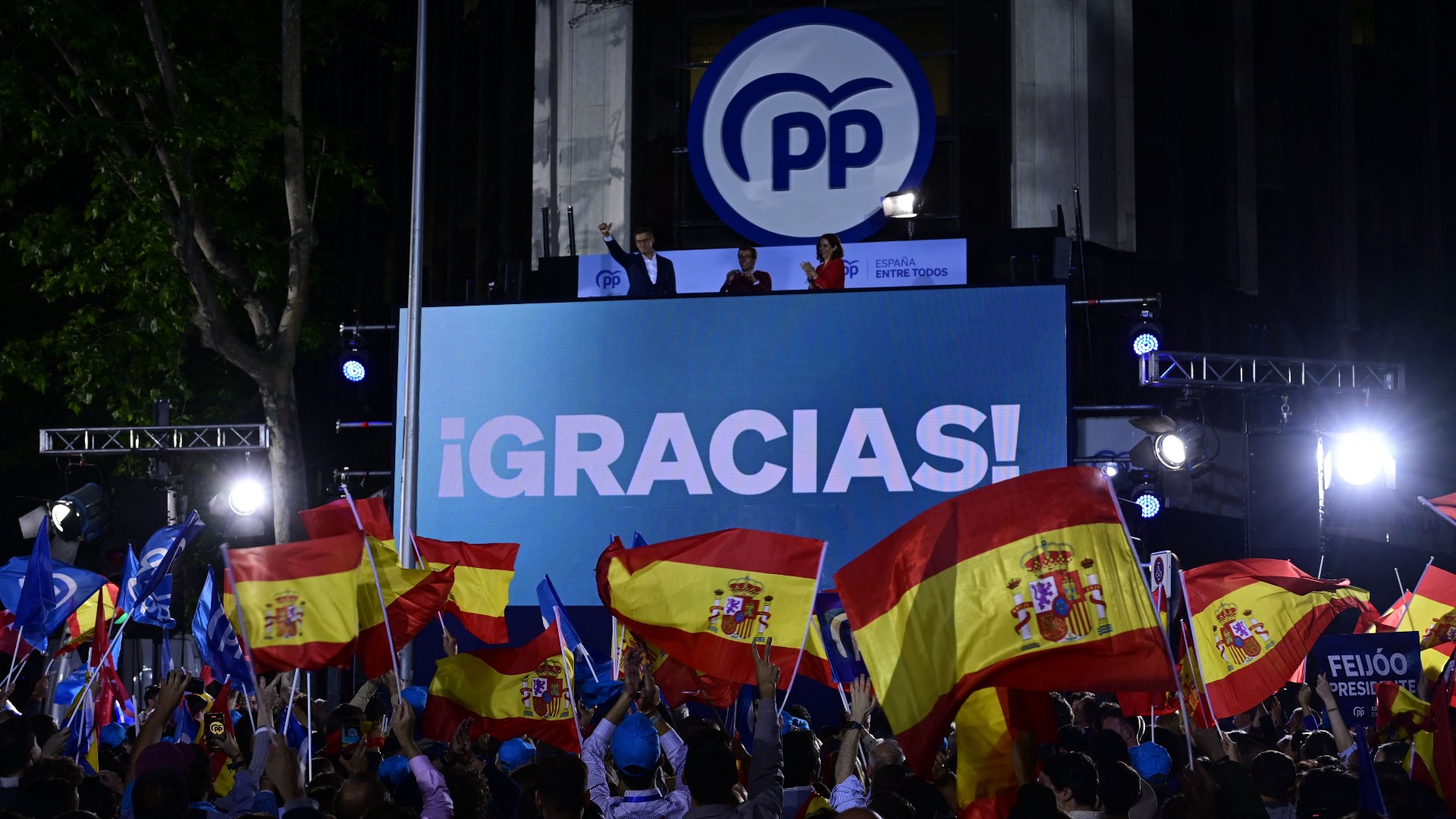What does the victory of the conservatives in Spain imply? 1:05
A day after the municipal and regional elections in Spain, a new relationship of forces appears on the horizon of the European country.
After the defeat of the ruling Spanish Socialist Workers' Party (PSOE) at the hands of the conservative Popular Party (PP), the President of the Government, Pedro Sánchez, announced on Monday the dissolution of Parliament and the call for general elections for July 23.
- Why are Spain's municipal and regional elections important towards the general elections?
Thus, these early elections arising as a result of the election results will take place five months before the ordinary deadline expires. And if the trend is repeated, the PP could overtake the current governing coalition led by the PSOE.
Who, then, have been the winners and losers this Sunday?
Popular Party (PP) supporters wave flags as they gather to celebrate the result in the 2023 municipal and regional elections. (Credit: JAVIER SORIANO/AFP via Getty Images)
The Government of Sánchez, all or nothing after the defeat
With about 99% of the votes counted, the Socialist Party will retain control of just three autonomous communities of the 12 disputed this Sunday (Andalusia, Catalonia, Galicia, the Basque Country and Castilla y León did not renew authorities this year), and where it triumphed it did so by a narrow margin.
advertising
Most of the rest of the communities will go to the Popular Party, with a presence in some of its coalitions or agreements of the far-right Vox, while in two regions the results are uncertain.
Faced with this situation, Sánchez said on Monday he had communicated to the king of Spain his decision to dissolve the Cortes Generales – as Parliament is known – and call early elections, according to government prerogatives marked in the Constitution.
"The formal call for elections will be published tomorrow Tuesday in the Official State Gazette so that the elections will be held on Sunday, July 23, according to the deadlines established by law," he added.
The President of the Government of Spain, Pedro Sánchez, votes on May 28, 2023 in the municipal and regional elections. (Credit: JAVIER SORIANO/AFP via Getty Images)
It is a risky move that virtually puts Sánchez on edge: either he receives strong support from the electorate to continue governing, or he loses majorities and cedes power to the PP.
The PSOE lost in the regions of Aragon, Valencia, the Balearic Islands and La Rioja, and in all those cases was overtaken by the PP.
Instead, it retained Asturias and Castilla-La Mancha. And in Extremadura, despite narrowly winning the popular vote, it tied with the PP in number of seats, and the conservatives could govern if they form a coalition with Vox.
It remains to be seen whether the PSOE can retain the government in the Canary Islands with these results, while in Navarre the local party Union of the Navarrese People (UPN) triumphed but it is not yet clear which force will be able to form a government.
In addition, the PSOE was defeated by the PP in mayoral elections in Valencia, Seville and Madrid, among other cities.
The Popular Party, the winner waiting for the generals
The results mark a shift in Spain's political map that could embolden PP leader Alberto Núñez Feijóo ahead of snap elections in July.
Alberto Núñez Feijóo, leader of the Popular Party.
If the PP repeats these numbers in July and manages to form a coalition, Núñez could become the next prime minister, an executive position similar to that of a prime minister.
In addition to the regions that the conservatives snatched from the PSOE, the PP retained the presidency in Madrid, Murcia, Ceuta and Melilla, and in Cantabria it displaced the Regionalist Party (PRC).
In total, the PP obtained 23,412 councilors in the different municipalities in dispute, with a total of 7,046,634 votes, compared to 20,784 of the PSOE, with a total of 6,288,907 votes, according to official data.
These are not large majorities, however, except in the case of the re-election of Isabel Díaz Ayuso in Madrid.
But the results show the return and consolidation of a two-party system between the PSOE and the PP – after years of electoral atomization that saw the rise of parties such as Podemos and Ciudadanos – in the context of a heavy defeat for the Sánchez government.
With information from Pau Mosquera and Reuters
ElectionsSpain
